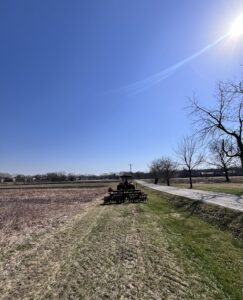By Russ Cerocke, Farm Manager
Climate, it’s changing, and it’s on many people’s minds, most certainly ours. This winter has been brief and spring has certainly sprung earlier than usual. Although we are currently experiencing an El Nino weather pattern leading to a warmer and drier winter for our area, I have no memory of a winter in Chicagoland being this warm and this dry. How much is due to the cyclical El Nino and how much is due to global climate change? Someone with more degrees than I might be able to clarify, but I surely can’t. What I can say is that these weather patterns do feel off. I was recently at the organic vegetable farming conference in Madison, Wisconsin and the number one headache, as voted on by a room full of farmers, was a cold, wet spring. Ironically, after the conference we entered a very warm and very dry spell. I guess cold, wet springs won’t be bothering any of us this season. However, what we are experiencing may turn out to be even more difficult.
 The warm, dry weather has been a blessing in some ways. For instance, my wife and I have been on more walks than usual this time of year, the birds came in early, and the fields became workable much sooner than anticipated. Due to the ideal conditions for field work, we have been able to disk and rotovate the beds for our earliest crops, seed the earliest scheduled cover crops, and by the time you read this, we will likely have the remainder of our cover crops planted before the rain at the end of the week. All of this sounds great, and without thinking too much about it, it has been!
The warm, dry weather has been a blessing in some ways. For instance, my wife and I have been on more walks than usual this time of year, the birds came in early, and the fields became workable much sooner than anticipated. Due to the ideal conditions for field work, we have been able to disk and rotovate the beds for our earliest crops, seed the earliest scheduled cover crops, and by the time you read this, we will likely have the remainder of our cover crops planted before the rain at the end of the week. All of this sounds great, and without thinking too much about it, it has been!
On the other hand, there is still a lot to wonder about. Last year we had a warm and very dry summer. Annual weeds were much less of a problem than usual, but the perennial weeds like Canadian thistle, having deep established root systems, made an unwelcomed showing. Our irrigation had to be run daily for almost the entire season, and thankfully, it held up to the challenge. With the dry period starting this early, we are a little concerned about the amount of rainfall we might receive this year. Another concern is the impact of insect pests on the farm. As an organic farm run by responsible growers, we cannot use high strength pesticides, and we try to use as little organic pesticide as possible. Despite our best efforts, we had a terrible infestation of cucumber beetles last year. Was it the dry weather? The early warmth? The mild winter? We aren’t sure.
Our winter this year has been even milder, the early warmth even warmer than last, and I have heard several other farmers expressing their concerns for increased pest pressure because of this. With winters becoming milder and springs warmer, insects that would normally be killed off or greatly reduced by our brutal midwestern winters are more likely to survive, even thrive, in the warming climate. For people, this means ticks; for plants, it means cucumber beetles, potato beetles, flea beetles, and maybe even some unexpected visitors from southern climes. We don’t know, none of us do, and that is the most worrisome part about all of this.
for plants, it means cucumber beetles, potato beetles, flea beetles, and maybe even some unexpected visitors from southern climes. We don’t know, none of us do, and that is the most worrisome part about all of this.
Thankfully, on our farm we use every practice we can to ensure our soils are healthy and rich in organic matter. The health of our soils and diversity of plantings makes us more resilient in the face of abnormal weather. Healthy soil can’t prevent every problem associated with the weather, but it goes a long way in giving our plants the best environment they can have to weather the storm, or lack of storms in this case. We will keep doing our best to farm in the most sustainable way possible, but at the end of the day, we need a stable climate for agriculture to be a feasible system. In times like this, I greatly appreciate this community for their forward-thinking, responsible lifestyles. It is each one of us doing our part to live simply, and reasonably, that will turn the tide on climate, if in fact the tide can still be turned. Keep fighting the good fight, we’re all in this together.
~Farmer Russ



